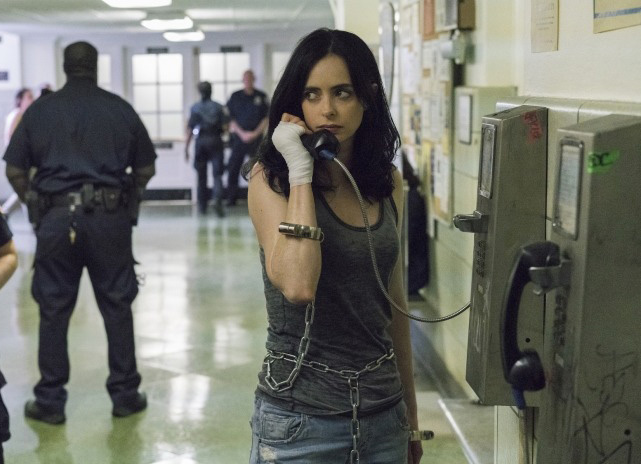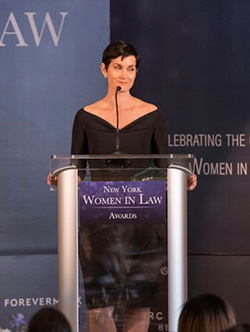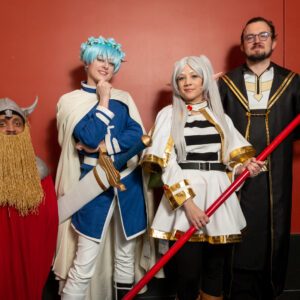Jessica Jones Season 2 Trades Pure Evil for Moral Complexity

It is going to be tough to write a spoiler-free review of the second season of the Netflix Marvel show Jessica Jones, because the big reveal needs to be kept secret, but is absolutely vital to what makes this season different from the first. I am committed, however, to never spoiling a show or movie in my reviews, so this could be a pretty short read.
The first thing that anyone about to watch Jessica Jones season 2 needs to know is that the main antagonist isn’t someone that embodies pure evil as Kilgrave (David Tenant) did in season 1. In fact, the main antagonist — I choose to avoid the term “villain” — is a character of remarkable moral complexity. More so even than someone like Doc Ock (Alfred Molina) from Spider-Man 2, who was one of the most sympathetic antagonists in any Marvel-based live-action property.
Starting with the basics, though, we find Jessica (Krysten Ritter) dealing with the emotional effects of (season 1 spoiler) having deliberately killed Kilgrave at the end of the first season. The rest of the supporting cast from season 1 also are dealing with their own issues, including Trish Walker (Rachael Taylor) and Jeri Hogarth (Carrie-Anne Moss). Malcolm Ducasse (Eka Taylor) is now Jessica’s assistant private investigator, but otherwise not much has changed in her day-to-day life.

As the trailers and commercials show, some incidents around Jessica cause her to dig into her past, to learn what happened to her after the accident and how she got her powers. As with all things related to her emotional pain, she does this with great reluctance. In fact, the entire season is mostly a series of slow build ups to Jessica being forced to make a tough decision. This makes it a bit easier to take than season 1, which was one continuous slow build to whether or not Jessica was going to get revenge on Kilgrave and stop him from killing more people in her life. Not having a breather for 13 episodes in the building of tension meant it couldn’t be sustained, and by episode 9 of season 1 I was pretty much done with having to wait for her to make a final move on Kilgrave.
Not everyone will agree that the pacing of season 2 of Jessica Jones works better. And I have seen online comments already about people missing the pure evil of Kilgrave. I get that, and while it may be an easy comparison to say those are the same people who complained about the addition of moral complexity to the Star Wars universe in Star Wars: The Last Jedi, I don’t think they are the same — well, not exactly.
The main complaint about Last Jedi is that Luke (and all the jedi) went from being a purely good character to one with complex motivations and actions. The same can’t be said for Jessica Jones. She was in season 1 and continues to be in season 2, a deeply flawed character who uses friends and abuses their trust to advance her objectives. She was never a purely good character, even if her heart was always a good heart. The difference this time is in how purely evil the antagonist is, and neither Darth Vader nor Kylo Ren are one-note evil villains. In that regard, the Star Wars franchise more closely mirrored this season of Jessica Jones than season 1.
For Marvel fanboys (like me) there is even less crossover with the MCU in general and the other Netflix shows in particular than last season. Only two characters that are primarily in other Netflix MCU shows make brief appearances — one that has no bearing on story and plot and seems only there for a guest appearance credit. That said, there is one fantastic addition of a minor character from the Marvel comics universe, played with humor and pathos.
The characters are written mostly very well, although there are some one-note characters that seem out of step with the rest of the writing. Trish’s mom, Dorothy (Rebecca De Mornay) is still nothing but a self-centered stage mom. The new cast member Pryce Cheng (Terry Chen), the other PI that we see in the trailers trying to buy out Jessica, is sadly also a rubber stamp of a cocky ex-military private security executive. A similar character role, Billy Russo (Ben Barnes) from The Punisher is a much deeper character.
Ultimately, the second season of Jessica Jones satisfies, with even better writing and construction than the first season. There are fewer plot holes and (marginally) less description or presentation of abuse. I don’t know if this fact can be applied to the credit for the quality, but IMDb proves what I thought I noticed during my binge-watching of the show — every episode director is female. If nothing else, Jessica Jones season 2 needs huge kudos for that level of representation.
Jessica Jones season 2 (Netflix, Marvel; TV-MA; 13 episodes; 4 out of 5 stars)




I thought this was a great season. I liked the first one but not as much as this season.